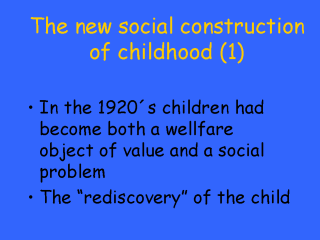 |
The prevailing image of the early stages of human life held at the turn of the
century represents a development of the childhood construction of the late
Enlightement and Romantic period, of the “discovery of the child” –in the
words of the most outstanding historian in this field, Philippe Ariès- as a
conjunction of innocence and death. Nevertheless the working child of the
industrial world does not fit easily in this schema. The new working child was
required to enter employment at an early age and this brusque introduction into
the adult world led to the loss of innocence.
|
